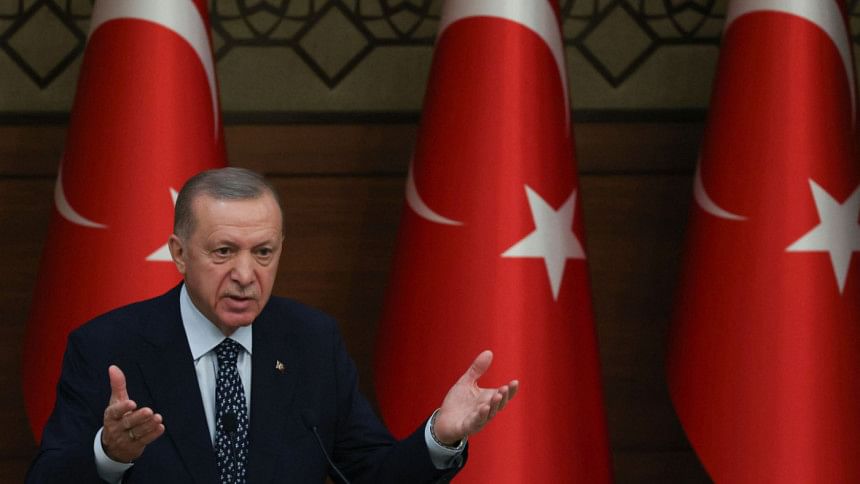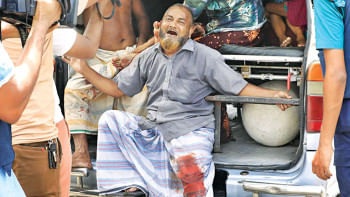The West should not meddle in Turkey's affairs

Turkey is heading for a run-off election that many international media outlets are terming "knife-edge," and rightfully so, as vote banks are witnessing an almost 50/50 divide between both Erdogan's ruling party (AK Party) and CHP's Kemal Kılıçdaroğlu-led opposition coalition, called the Table of Six.
In the election held on May 14, neither of the two major candidates could secure more than 50 percent votes needed for a decisive victory – Erdogan secured 49.51 percent while Kılıçdaroğlu received 44.88 percent. The May 28 run-off is seen as a crucial moment in Turkey's recent history.
This particular election is turning into a nightmare for healthy democracy in the nation, with the prevalence of smear campaigns and political pressure. Take, for example, Muharrem Ince of Homeland Party pulling out at the last minute in the face of vile smear campaigns allegedly funded by the CHP party, or forcing some to return to the opposition coalition (Good Party's Meral Akşener was apparently forced to return to the Table of Six after she pulled out). But fingers have also been raised at foreign powers for meddling in the elections.
Erdogan has been very vocal about Western countries interfering in Turkish elections to put their "puppet" (Kemal Kılıçdaroğlu ) in power. "It is a shame. What can you say if I tell you that the United States, Britain and Germany manipulate the elections?" Erdogan had said, slamming the West.
Interestingly, the West has good reasons to be wary of Erdogan. For one, in the aftermath of decades of military interventions and political unrest, during the two-decade rule of Erdogan, Turkey has come a long way in establishing itself as a key geopolitical player in Europe, Asia and the Middle East, and Erdogan's assertive foreign policy has challenged Western hegemony over the global order.
Erdogan – unlike many past leaderships – is no puppet of the West and has certainly not been docile to the West's demands. He maintains a pragmatic stance when it comes to maintaining strategic relationships with China and Russia, and for obvious reasons. Both these countries are major power brokers, and Erdogan's decision to engage with them are purely based on Turkey's interests, which does not necessarily always align with the West's.
Another point of contention between the West and Erdogan is Turkey's veto power on Nato membership. Case in point: Turkey vetoed the membership attempts of Sweden and Finland in Nato. While Turkey has recently lifted its veto on the bid of one of these two nations, its relationship with both the countries has been rocky. With Finland, it was about the country's firearms embargo on Turkey post Syria intervention; with Sweden, it was Stockholm's perceived support for Kurdistan Workers' Party or PKK – and its affiliates – which Turkey considers a terrorist organisation and a threat to its national security.
Moreover, Turkey's muscle flexing in the Middle East and in global politics as a revisionist power – for instance playing a prominent role in Syria, Iraq, Libya, Eastern Mediterranean, brokering the Black Sea grain deal at the height of the Russia-Ukraine War – challenges the status quo and threatens the West's sphere of influence.
Naturally, Erdogan's anti-West stance has rendered him an eyesore for the West and led the Western media to brand him as an autocrat and attempt to turn the Turkish population –especially the youth – against him. It is true that Erdogan is no saint and has his share of judgemental errors and high-handedness in suppressing dissent. But the simple question remains: who is the West to interfere in another sovereign, democratic nation's elections? Who is Joe Biden to call Erdogan an "autocrat"?
There is no denying that despite his limitations, Erdogan has immensely contributed to Turkey's development and given the nation much-needed political stability. He has given the nation a one-hundred-year vision – Century of Türkiye – to cherish and lead; and he has brought the much-needed balance between tradition and transformation – for which he is disliked by a section of Turkey's military.
It is understandable that Erdogan has led Turkey for long and change is needed. But what kind of change is Turkey looking at under the leadership of Kemal Kılıçdaroğlu?
Kılıçdaroğlu is an inconsistent politician: on the one hand he has pledged "freedom and true democracy" and a "civilised world" to the people, and on the other, he woos the ultra-nationalist right-wing with promises to crack down on helpless migrants and refugees. He is lenient towards the controversial Islamist fraternal movement led by Fethullah Gülen – currently residing in the US – called FETÖ, while he calls out Erdogan for not protecting Turkey's borders by accommodating refugees from neighbouring war-torn countries.
To put it mildly, Kemal Kılıçdaroğlu seems unsure about his ideologies, ethos and policies and might not be the right candidate to lead change.
"Change" is a contagious term. It has the ability to ignite passion among masses and fill them with hopes and dreams. But change under an inconsistent leader can be counterproductive.
Despite Western support for Kılıçdaroğlu and the propaganda against Erdogan, it is ultimately up to the Turkish people to decide which leader will lead them into the Century of Türkiye. The West should demonstrate integrity and leave it up to them to choose their leader in the run-off, without interference.
Tasneem Tayeb is a columnist for The Daily Star. Her Twitter handle is @tasneem_tayeb

 For all latest news, follow The Daily Star's Google News channel.
For all latest news, follow The Daily Star's Google News channel. 







Comments